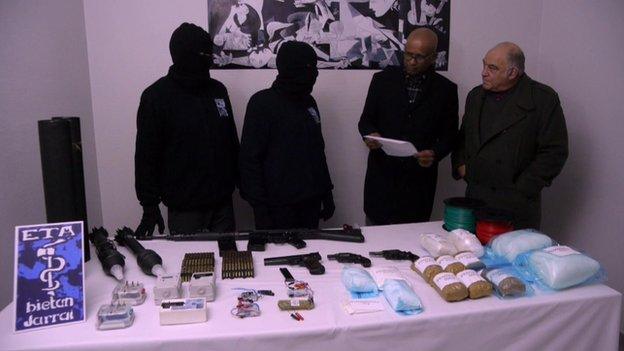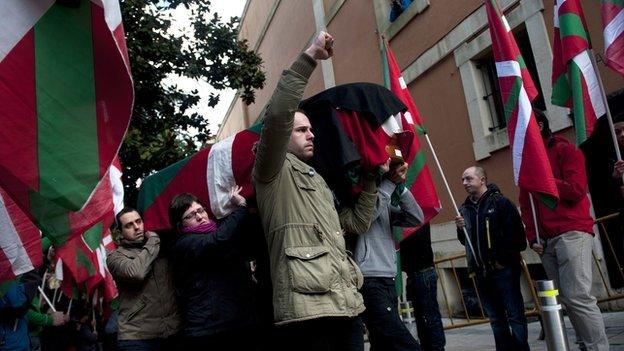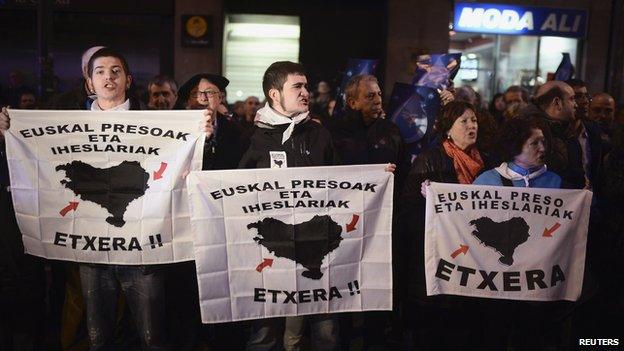Spain wants more than Basque Eta arms gesture
- Published
Video passed exclusively to the BBC shows what the verifiers hope is the start of a process of complete disarmament.
A disarmament gesture by the militant Basque separatist organisation Eta does not yet signal a peace process, but international mediators acting as verifiers are hopeful.
The so-called "International Verification Commission" says it has put a small part of Eta's arsenal under seal.
The Spanish government has dismissed the disarmament move, and the verifiers' role, calling the Eta gesture "theatrical".
Eta declared a definitive end to hostilities in 2011.
Video passed exclusively to the BBC in London by an intermediary shows two masked militants from Eta, dressed in black, displaying a few of their weapons laid out on a table for inspection by the verifiers.
The video was handed over by an intermediary acting with full approval from the Amsterdam-based team of arms verifiers, who are trying to build on Eta's ceasefire.
The pictures, recorded by Eta at a secret location, show two of the international verifiers looking on. They are hoping this could mark the beginning of full disarmament by Eta.
Symbolic step
The verifiers in the video are Sri Lankan Ram Manikkalingam and Ronnie Kasrils, a former South African guerrilla leader in the African National Congress (ANC). They are seen signing what is apparently an inventory. They say these guns and explosives have now been put under seal and beyond use. They call it a hugely important first step.
The weapons seen on the video include what appears to be a G3 assault rifle with two magazines, a semi-automatic pistol and two revolvers.

The video shows verifiers Ram Manikkalingam and Ronnie Kasrils (R) with two masked militants
There are also seven plastic bags, each labelled as containing half a kilo of Pentrita high explosive, plus what look like three anti-tank rockets, but without a launcher, as well as detonators and timing devices.
The verifiers regard this as only a very small part of Eta's total arsenal, but for them the symbolism of Eta's participation in an apparent act of disarmament is what counts. The militant group was declared "a terrorist organisation" by the European Union in 2001.
It has a long and bloody past, and has killed more than 800 people across four decades.
Militants cornered
Eta was formed more than 50 years ago in the era of Spain's dictator, General Franco, to fight for an independent Basque homeland.
A huge Eta bomb in Madrid in 1973 killed Spain's then Prime Minister, Luis Carrero Blanco.
That killing ensured the whole world took notice.
In 1980, Eta militants killed 118 people in Spain, making it the group's deadliest year.
But the combined efforts of French and Spanish security forces over the past 20 years in the border area known as the Basque Country led to a string of arrests, stripping Eta of its leadership and driving it to a position seen by many observers as effective defeat.
When Eta declared an unconditional end to armed activities in October 2011, it was seen as a major breakthrough. The Spanish government welcomed the move, but insisted Eta must go on to disband and disarm entirely.

A convicted Eta militant, Arkaitz Bellon, died in a Spanish jail recently
The government in Madrid refuses to negotiate with Eta, and does not recognise the verification commission, which is spearheading efforts by large numbers of international political figures and specialists in peace-making.
Those mediators hope the latest move by Eta could create a better climate for dialogue between Madrid and recognised Basque nationalist parties and groups, some of which have been hobbled and stigmatised by association with Eta.
Prisoner releases
Since the Eta ceasefire declaration the Spanish authorities have been forced to release some Eta prisoners, following a ruling from the European Court of Human Rights. But hundreds more who are not covered by the ruling remain behind bars.
Most Spanish people think that is where they should be, and condemn Eta.
But sympathisers are urging the Spanish government to release many more, and to move Eta prisoners from jails in distant parts of Spain to places much closer to their families in the Basque Country, who find visits both difficult and prohibitively expensive.
So reaction to the latest development will be crucial. The verification team says Eta has now put some of its weapons beyond use. But does this amount to any sort of political game changer?

Many nationalist supporters want Eta prisoners to be moved to Basque jails
- Published4 January 2014
- Published26 December 2013
- Published8 November 2013